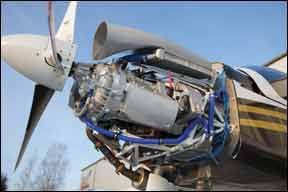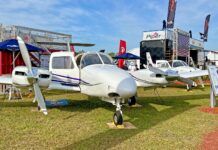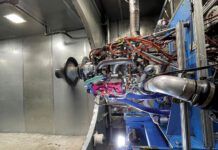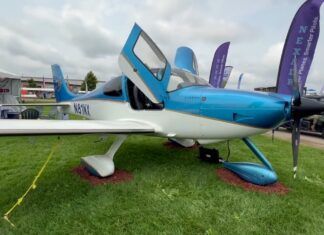In business, its axiomatic that eight of 10 startups fail within three years. In general aviation, if anyone bothered to track them, the odds are probably a little worse. Nonetheless, when Thielert Aircraft Engines GmbH went belly up in the spring of 2008, it was a surprise to many who had been following the company casually. Diamonds innovative DA42 was selling well, the engines seemed to be performing and with avgas threatened, the trend line appeared to point in only one direction: up. Yet in the summer of 2011, the company remains under the bankruptcy protection of German law. But it also continues to operate, delivering both new engines and parts, albeit at high prices. And despite market projections that persistently show Jet A piston engines as the wave of the future, Thielert still has more engines flying than anyone else and no competitor has yet challenged its dominance.
How Goes It?
With three years of reorganization behind it, we wondered if Thielert had gotten back on its feet, improved its engines and established a service network that owners and operators can rely on. The short answer is mixed. The company claims to be profitable, but parts and engine prices are high. Owners of Thielert engines say service has improved, especially in the last year, but some complain that the company is more interested in its bottom line than in satisfied customers. “The people running it now don’t have a feel for the aviation business,” we were told by one operator of two DA42 twins. “They are just interested in the business of running companies in bankruptcy.”
To put that comment in context, you need to understand that German bankruptcy laws are different than those in the U.S. Specifically, when a company files for insolvency, the government appoints a special master-in this case the law firm of Bruno Kubler-whose sole assignment is to right the companys finances, without regard to protecting customers, vendors or its market share. As a result, customers saw huge leaps in prices for such critical components as gearboxes, clutches and pumps and with no other sources, owners had the choice of paying up or grounding their airplanes. Turning aggravation to irritation, bankruptcy rules also require invoices to be paid in full before parts were shipped.
Thielert still exists as a business entity, but to keep from being hobbled by insolvency limitations, it provides parts and engines to Centurion, a separate company organized to act as a Thielert agent. If a buyer ever materializes for Thielert, it would acquire both companies, according to Centurion CEO Jasper Wolfson.
No Interruption
Our interviews with customers reveal a mixed pattern of customer service and satisfaction. Wolfson told us that despite its financial troubles-including a criminal investigation into false invoicing and reporting-Thielert never shuttered production. It continued to deliver engines and parts, albeit at much higher prices.
As Thielerts largest volume customer, escalating prices and complaints about service prompted Diamond to wash its hands of Thielert and start its own engine company, Austro. Austro makes its own version of the same Mercedes-Benz-based four-cylinder automotive diesel. Diamond offers this engine in the DA42 NG, and it has offered owners the option of converting from Thielert to Austro engines at favorable prices.
It has found some takers. Embry-Riddle Aeronautical University, for instance, recently converted one of its Thielert-powered DA42s to Austro engines and one of our editors flew it from London, Ontario, to Oshkosh. The reason for the conversion? “We had a very difficult time getting parts from Thielert,” said ERAUs Joe Maynard in an interview at AirVenture. “We would call Diamond in London, they would call Diamond in Austria…it was a communication breakdown. It was tough to get parts.”
In fairness, not everyone reported the same experience. Two operators we spoke to told us they didnt have the same kinds of problems getting parts, but they were less thrilled with the delays and having to pay for them up front. Centurions Wolfson said the company heard the complaints and has streamlined payments and invoicing so parts can ship the same day theyre ordered, or shortly thereafter. In

addition, it now stocks most of the principle parts in the companys Texas service center, and owners confirmed that parts response from Texas has generally been good and have improved during the last year.
Operating Costs
Our interviews with owners revealed decidedly mixed reports on operating costs. Although all of the operators we talked to reported good reliability and dispatch rates, the incidence of scheduled maintenance remains high-or at least expensive-and owners are on the hook for the downtime and cost of required replacement parts.
In addition to ERAU, one of the highest time operators of Thielert diesels is Stan Fetter, whose busy traffic reporting service in the Washington, D.C., area operates a couple of Cessna 172s converted to Thielerts at least five days a week. He has about 5600 hours total time on both the 1.7 and 2.0 engines combined. One of the 1.7 engines-Thielerts original product-went to 2580 hours before being recently replaced. Installed in November of 2006, Fetters 1.7 engine was the fleet leader in total hours.
During its service life, it had the oft-experienced cracked cylinder head problem, which was addressed as a warranty claim, but it did not have the oil cooling nozzle issue that many other engines did. And then there were the gearboxes, a sore point for all Thielert owners.
From the beginning, Thielert structured its costs to allow for gearbox and clutch inspections/replacements at 300-hour intervals and these were, on paper at least, built into the cost of the engine. Because a diesel delivers power with strong torque impulses that transmit through the crankshaft, gearbox and prop, Thielert took the conservative approach of requiring the gearbox and clutch inspections, with the intent of a life extension program that would increase the inspection/replacement interval.
For Fetters high-time 1.7 engine, that worked out to eight gearbox changes. “Thats never been a problem. That stuff is there, as long as youre willing to write the check. Generally, it comes out of Texas. So its not a shipping or a time delay event,” Fetter said.
But it is an expense. At about $3500 a pop, gearbox maintenance alone on the 1.7 engines amounts to about $12 an hour. The improved 2.0 engines have a water-cooled gearbox with a 600-hour replacement cycle.
Although it was promised, the gearbox inspection/replacement interval was never increased for the 1.7 engine, but the clutches went to 600 hours. Some parts did get life extensions, such as the feed and high pressure pumps, whose life was extended to 1200 and 600 hours, respectively. These were originally 300-hour parts. Furthermore, in the clutch assembly, only the disc itself requires replacement; the pressure plate is good for the life of the engine. Engine alternators also require replacement at 600 hours for both engine types.
Different Numbers
Pinning down exact operating costs is possible, but putting them in the larger context is not easy. For example, Fetter keeps careful records and told us his maintenance costs for his two diesel airplanes were $21.51 and $23.48, less fuel, which runs about $16 an hour in additional costs. That includes the gearbox and pump replacements. For his Lycoming 172s, fuel costs are $41 an hour, at wholesale prices, plus what we would estimate is an additional $8 in engine reserves. But Fetters numbers for his Thielerts don’t include amortization of the $60,000 conversion cost. Nonetheless, Fetter still figures hes ahead.
“Im not putting cylinders on the Lycoming, Im not screwing around with mags, Im not fighting the electrical system. I don’t have reliability problems. I have to have the airplane ready for rush hour. To make sure I had two ready to go every day, I had to have three or four Lycoming airplanes sitting out front. Now, at worst, its three. You don’t have stuff go wrong between the hundred hours. All thats gone,” Fetter told us.
But not everyone has the same view of Thielert engine economics. Jeffrey Soules, who has a 70-airplane flight school and FBO operation based in Denton, Texas, told us the companys Thielert 2.0 airplane has a higher hourly maintenance cost than its King Air A90. His data puts the Thielert airplane at $87.80 per hour on maintenance, the King Air at $51.40, a number that doesnt include fuel or engine reserves, just wrench hours. Although dispatch reliability has been good, Soules operation has
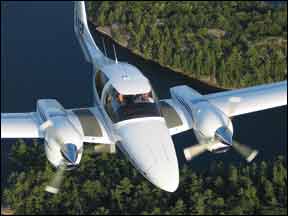
experienced some extended downtimes and hassles with dealing with Centurions German headquarters. But like others, he says customer response is getting better.
Another flight school we checked with, Lynn University in Boca Raton, Florida, gave us a similar report. According to Tim Jensen, the schools chief flight instructor, the DA42 bills for $380 per hour, with only about $40 to $50 of that for fuel, according to our calculation. Lynn is a non-profit, so that number represents a bare-bones cost of doing business. Commercial rates on the DA42 are at least $100 more an hour.
Lynn bought its airplane just as Thielerts financial troubles came to light, but with a $50,000 deposit on a $600,000 airplane, it felt it had no choice but to proceed with deal.
Have they been satisfied with the airplane? Short answer: Yes.
“Its been great. Theyve been very reliable. The numbers are true to the POH and theyre fuel efficient. We love the airplane. Our squawk is the stupid gearbox,” Jensen told us. This is a sentiment we heard repeatedly. Despite the warts with the engines-and they are considerable for some operators-everyone loves the DA42 as a reliable, fun-to-fly and economical twin. The Lycoming-powered version also gets rave reviews.
Conclusion
Were not sure we can draw one at this point. Although owners we spoke to gave the DA42 glowing reviews, their opinions of Thielert engines are more reserved, which is not to say necessarily negative. They like the operational simplicity, the economy and the reliability. Theyre less confident about the companys long-term presence in the market and no one likes the required replacement of gearboxes, pumps and alternators.
Despite Thielerts troubles, we didnt hear anyone describe the engines as outright failures, nor did anyone tell us they wouldnt purchase the airplanes again, although some owners may think that. When asked if he would buy the airplane again, U.S. Aviations Soules said he wasnt sure. “Thats a tough question,” he said.
How about Stan Fetter? Would he buy again, converting his 172s to diesel power? “I think so. It would depend on the Euro situation at the time. My installed cost on these was about $60,000 each and now, Im not sure you could do it for that given the Euro exchange rate,” he told us.
While we found a distinct lack of ringing endorsements for Thielert, we also found no vein of opinion that suggests buyers think the engines have no future. More curious to us is that even with avgas apparently on the ropes and with increasing promotion and market activity in the diesel field, only one major OEM-thats Diamond-offers a diesel option and thats the Austro, not the Thielert.
We know that Cessna still has diesel projects active and before he departed Cessna, Jack Pelton told us the company has tested or considered all of the diesel offerings. But it still doesnt have a diesel airplane you can buy, having frozen the Thielert-powered 172 project just before the company went into bankruptcy.
It seems to us that if the diesel market will inevitably expand, displacing gasoline engines, the sharp edge of that wave still isn’t visible.

